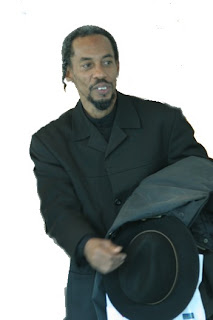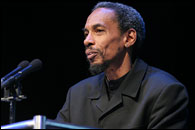Thursday, November 15, 2007
Wednesday, November 07, 2007
Whether or NOT

A unique collection of selected poetry tracing the history and diverse cultures of Trinidad & Tobago plus the wider Caribbean heritage. Many of these poems are included on the award winning spokenword CD:Y42K. First published in 2000, this edition is introduced by Dr Lauri Ramey and includes a commentary by Lennox Raphael.
Printed: 90 pages, 6" x 9", jacket-hardcover binding, black and white interior ink
While acknowledging the usual categories in which a poetry of conscience is often slotted, describing Kwabena's poetry as solely "political" or "performative" does not do it full justice. Raised in a home where literature was present and stressed, including the works of a broad range of Caribbean and African American writers, Kwabena also experienced the early influences of classroom memorisation at the tail end of the colonial educational system.The combination of oppression and release proposed by poetry — reciting Byron and Skeete at school, while reading Selvon and Du Bois at home — must have been instilled at a young age via such exposure. It was an early lesson that language could be a source of productive tension to illuminate forces (repressive as well as enabling) that otherwise would remain hidden.
For example, in 'westindia', cultural identity is reclaimed through the careful repetitive construction of the negative case. The poem is framed with the opening and closing couplet: "here is not west india/here is not west india." Names, our most primal linguistic emblem of identity, are shown to be symptomatic of the problems of the colonial legacy. The list of place names is solemnly intoned
st croix
st kitts
st eustatius
st vincent
st thomas
as the poem echoes the litany of saint names for locales where the namers "never, ever trod." The word "look" is repeated, a plea and demand in one, as the poet begs and insists that the irony of the situation be recognised and acknowledged. This drumming of an intoned and highly significant word becomes in this collection what is what is commonly known as leitworter (Martin Buber) — a frequent device in biblical narrative as well as the earliest African American poetry, notably spirituals (which so strongly influenced much of later Black American verse) — where single words or phrases accrue the weight of a central theme, beyond what an individual word can ordinarily bear.
The "what we are not" is impeccably balanced with "what we are." These poems amply trace the historical and political path of the Gallabi as an indigenous population through a wealth of documentation. There is a thrust in this collection as a whole to recapture the unique legacy of Caribbean peoples, who share Diasporic links but also remain distinct. Here is where we experience Kwabena as poet-teacher: the "Obeahman" he aspires to be in his anthemic poem is, ironically, the figure he has become in Whether Or Not. Traditionally, in "new age bois," the speaker in the poem calls on the spirits of the ancestors to empower him to bring their energy — and burdens — into the present for resolution, tirelessly. There is an implicit charge to the reader to enter into the process of education by means of enculturation.
An excerpt from the Introduction
Roi Kwabena's Whether Or Not
Dr. Lauri Ramey, Department of English,
California State University, Los Angeles
Sunday, November 04, 2007
Monday, October 29, 2007
Thursday, October 25, 2007
appreciating my indigenous heritage
Santa Rosa is but a vestige of the colonial and religious Spanish zeal diluted with indigenous, African and Asian traditions. The Spanish gave up Trinidad to the English without a battle, being unable to defeat the Ineri (the original inhabitants). But continuing in another vein, permit me to interject that your and my history is so inter-linked that there is obviously no way we can undo those ties. For instance, after the French revolution, a lot of French planters fleeing Haiti (then renamed Santo Domingo) were allowed to settle in many islands under control of the British. This was called the Cedula of Population, circa 1738. This is the plan that allowed the cousin of Marie Antoinette (a ruthless planter named Count Beggorat) and many others to bring their slaves, their language, culture, and their Catholic religion and despicable attitude toward blacks and to settle in my village, Diego Martin, in and other lush parts of Trinidad, under Spanish law but governed by the British. This is an example of the united Europeanisation of the region......"
from an interview of Roi Kwabena by Dr Eric Doumerc
Wednesday, October 17, 2007
Legacies to be cherished....

"... Our children need to be told of the efforts of those chanting stick-fighters, drummers (the drum is still banned by archaic European laws retained in the so-called colonies to this day), even those women whose heroic organising planted the seeds for the trade-union movements, tamboo-bamboo players whose inventiveness led to the steel pan (the greatest musical invention for the 21st Century), played all over the world yet to be included on my country's education curriculum), forgotten reformers who bled for a nationalism which is forsaken today.
From a musical point of view, our Kaiso has grown and gave birth to calypso, soca ragga, and chutney (the latter with the influence of Asians). But sensible lyrics have been banished. Even double-entendre, humour and messages have disappeared, so that today only synthesisers, electronically programmed rhythms, gyrating waists and waving a sweat-soaked rag are in vogue (very much reminiscent of the old days when the French bourgeois waved their handkerchiefs in such like processions. So yes, these aspects of my culture do give me energy to continue writing...."
Excerpt of an interview with Roi Kwabena by Dr Eric Doumerc,
University of Toulouse-Le Mirail, France





